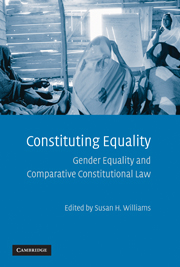Book contents
- Frontmatter
- Contents
- List of Contributors
- Acknowledgments
- CONSTITUTING EQUALITY
- Introduction: Comparative Constitutional Law, Gender Equality, and Constitutional Design
- SECTION ONE STRUCTURE
- SECTION TWO RIGHTS
- SECTION THREE CULTURE/RELIGION AND GENDER EQUALITY
- 6 Must Feminists Support Entrenchment of Sex Equality? Lessons from Quebec
- 7 Deconstructing the East/West Binary: Substantive Equality and Islamic Marriage in a Comparative Dialogue
- 8 Conflicting Agendas? Women's Rights and Customary Law in African Constitutional Reform
- 9 Gender Equality and the Rule of Law in Liberia: Statutory Law, Customary Law, and the Status of Women
- SECTION FOUR CONSTITUTIONS AND INTERNATIONAL LAW
- SECTION FIVE WOMEN IN THE PROCESS OF CONSTITUTION MAKING
- Conclusion: Gender Equality and the Idea of a Constitution: Entrenchment, Jurisdiction, and Interpretation
- Index
- References
8 - Conflicting Agendas? Women's Rights and Customary Law in African Constitutional Reform
Published online by Cambridge University Press: 26 October 2009
- Frontmatter
- Contents
- List of Contributors
- Acknowledgments
- CONSTITUTING EQUALITY
- Introduction: Comparative Constitutional Law, Gender Equality, and Constitutional Design
- SECTION ONE STRUCTURE
- SECTION TWO RIGHTS
- SECTION THREE CULTURE/RELIGION AND GENDER EQUALITY
- 6 Must Feminists Support Entrenchment of Sex Equality? Lessons from Quebec
- 7 Deconstructing the East/West Binary: Substantive Equality and Islamic Marriage in a Comparative Dialogue
- 8 Conflicting Agendas? Women's Rights and Customary Law in African Constitutional Reform
- 9 Gender Equality and the Rule of Law in Liberia: Statutory Law, Customary Law, and the Status of Women
- SECTION FOUR CONSTITUTIONS AND INTERNATIONAL LAW
- SECTION FIVE WOMEN IN THE PROCESS OF CONSTITUTION MAKING
- Conclusion: Gender Equality and the Idea of a Constitution: Entrenchment, Jurisdiction, and Interpretation
- Index
- References
Summary
INTRODUCTION
Since the 1990s, women's organizations in Africa have been advocating for constitutional reforms and legislative changes to protect their rights and increasingly, they have been successful in these efforts. Most notably, there has been the increasing introduction of clauses, which allow the constitutional guarantees of equality to prevail in the event that there is a clash between women's rights and customary laws and practices that violate women's rights, discriminate against women, or infringe on bill of rights provisions regarding gender equality. These are extremely profound challenges. They are, in principle, attempts to legitimize new law-based sources of authority for rights governing relations between men and women, family relations, and relationships between women and traditional, clan, and religious leaders. In the past, even when laws existed to regulate marriage, inheritance, custody, and other such practices, customary laws and practices co-existed and generally took precedence when it came to family and clan concerns. Even though in practice these customary norms may still prevail today, women's movements are now challenging them through constitutional and legislative changes in ways that we have not seen in the past.
This chapter examines the role women's movements have played in introducing new gender related provisions within African constitutions and legislation. In particular, it shows how customary law pertaining to marriage, inheritance, land rights, and other such laws affecting women's rights have been far more challenging to pass than provisions pertaining to state and market related institutions, for example, employment practices, taxation of women, and maternity leave.
- Type
- Chapter
- Information
- Constituting EqualityGender Equality and Comparative Constitutional Law, pp. 173 - 194Publisher: Cambridge University PressPrint publication year: 2009
References
- 1
- Cited by



